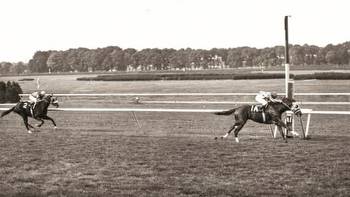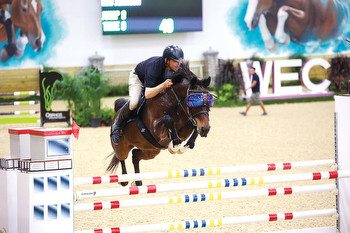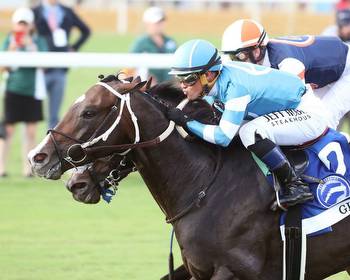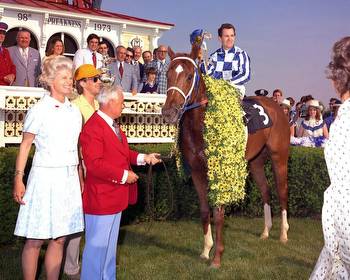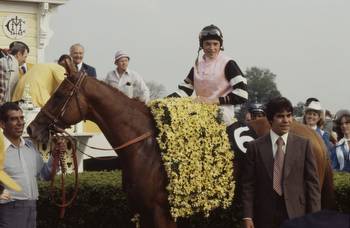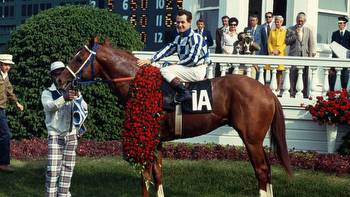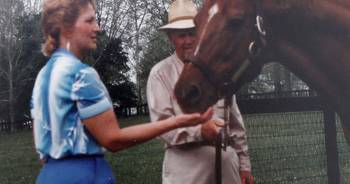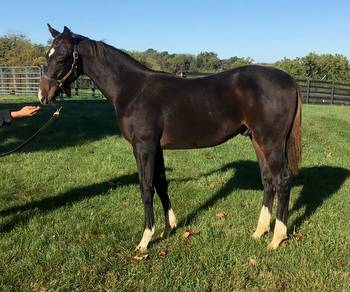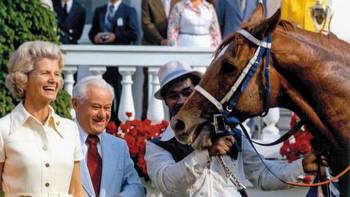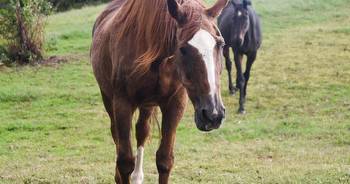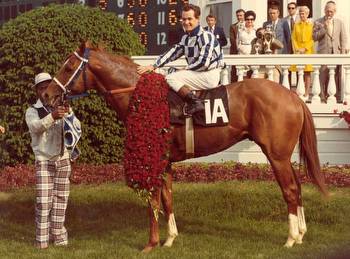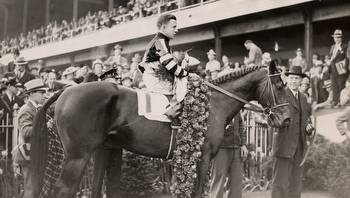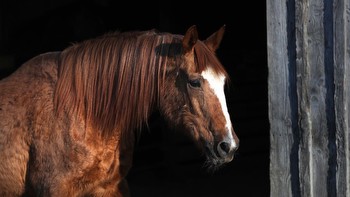A world away from Kentucky Derby glory, Secretariat’s forgotten daughter found a bright future
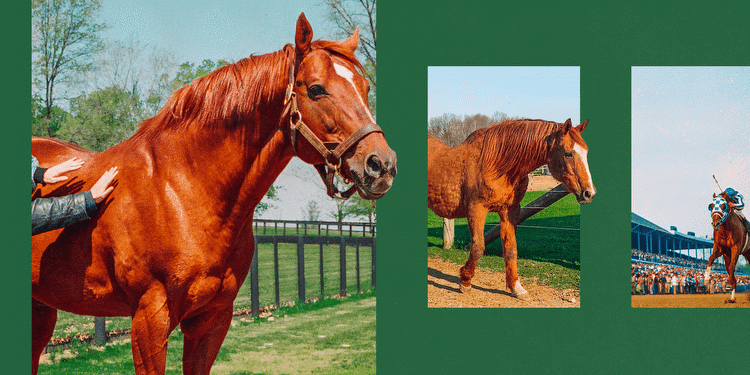
COCHRANTON, Pa. — There is no sign or even a marker, only the house number decals stuck to the side of an ordinary black mailbox to inform visitors that this is the right place. Bright Futures Farm is home to eight retired thoroughbreds, but neither the farm nor the horses are the sort people seek out. These are not your resplendent rolling hills of Kentucky bluegrass where champions graze. This is a hardscrabble farm rooted in northwestern Pennsylvania that once welcomed oil barons but has long since been abandoned by industry and wealth, and animals similarly abandoned by their owners.
The farm sits at the end of a narrow, rutted driveway gone muddy by days of rain. To the right is a pleasant, if unassuming, house sided in hemlock, and to the left a chicken coop. At the top of the drive sits a serviceable gray barn where inside, in the first stall to the left, is a 34-year-old mare by the name of Trusted Company.
This weekend, 400-odd miles and a world away from here, horse racing fans, bucket list makers and those just in search of a good party will descend on famed Churchill Downs for the 149th running of the Kentucky Derby. On Friday, as the fillies load for the Kentucky Oaks, it will be 50 years to the day since a 3-2 favorite broke from the starting gates on a gallop toward immortality. In the half-century since, no horse has touched Secretariat’s Kentucky Derby record of 1:59.4 or, for that matter, his Preakness (1:53) or Belmont (2:24) finishes, either.
Thanks to Walt Disney Pictures and YouTube, the great horse lives on, forever “moving like a tremendous machine,’’ as he did in his triumphant 3-year-old campaign in 1973. But time pauses for neither man nor horse. With each passing year, the connections to Secretariat dwindle. Big Red himself died in 1989, laminitis doing what few equine challengers could. The hoof disease defeated the horse on Oct. 4 of that year.
Of the human connections, only Ron Turcotte is still alive. The 81-year-old jockey, paralyzed in a race in 1978, lives in Canada, where he’s happy to recall his three rides into history. But Secretariat’s devoted groom, Eddie Sweat, died in 1998, and trainer Lucien Laurin two years later. Ogden Phipps, who memorably lost the rights to Secretariat in a coin flip, died in 2002, and the woman who won the horse’s rights, Secretariat’s fierce and beloved owner Penny Chenery, died in 2017 at age 95.
Via the sprawling genetic tree bound to a 15-year stud career, Secretariat will always live on in some ways. He sired 663 named foals, those horses creating endless bloodlines that eventually wind their way back to Big Red. American Pharoah, who broke the 37-year-old Triple Crown hex in 2015, is a great-great-great grandson of the horse.
But only two of those 663 direct progeny are still alive. One, Maritime Traveler, a one-time teaser stallion, has enjoyed an idyllic retirement in the paddock of the stallion barn at Bridlewood Farms, a reputable breeding farm in Ocala, Fla.
The other is happily munching on some hay at a 501(c)(3) charity for rescued horses. Like her stall mates who call Bright Futures Farm home, Trusted Company, the daughter of Secretariat, arrived here because she had nowhere else to go.
She is startlingly similar to her famous father — her coat tinged red; an arrow-shaped blaze beginning on her forehead and narrowing toward her nose; two of her hooves socked with white. She’s also something of a ham. As people chat about her daddy in front of her barn, proclaiming the dominance of Secretariat’s unbroken records, Trusted Company bobs her head at her stall door, as if she’s nodding in agreement. Bev Dee, the owner of Bright Futures, chuckles. “She’s a doll,’’ she says. “Such a sweet, good-natured horse. She really is.’’
Life is good now for Trusted Company. Her back bowed by age and a recent knee injury putting something of a hitch in her giddyup, she is nonetheless fairly spry for such an old horse. When Dee takes advantage of a break in a dreary day to turn her horses outside, Trusted Company leaves her stall contentedly to roam around, chased by T, her stall neighbor and best friend — the Pa Kettle to her Ma, as Dee refers to the pair. Dee eventually coaxes the two into the pasture, and Trusted Company finds a spot under a tree, somewhat protected from the light drizzle, and happily grazes.
She is the eldest of this particular retirement community, the others ranging from 22 to 30. There are, Dee admits with a grim smile, no happily-ever-after endings here; only peaceful late years. She wakes up at least once in the middle of the night to check her barn cameras and ensure her horses are safe, and when she heads out in the pre-dawn hours to start her long day, she’s overwhelmed as much with relief as she is joy.
Twenty-five years ago, Dee was a successful corporate executive, working for Cellular One just as cellular technology took off. The job, she admits, was frankly easy thanks to the rules of supply and demand, and left her with plenty of time on her hands. “I learned how to golf,’’ she laughs. It also afforded her the chance to pursue a lifelong passion. As a kid, Dee used to visit her grandfather, an avid horse follower who told her tales about watching Man O’ War race, and ride along the backs of the shire horses as they plowed the fields. She thought about becoming a veterinarian, but decided in college that the science was too much and pivoted to marketing.
She never lost her love for horses, though, and blessed with both time and the means to fulfill her interest, she took herself to Kentucky to check in on some of her favorite racehorses. With equal parts gumption and naivete, she rolled up to Gainesway Farm, one of the finest breeding farms in the nation, in her Porsche. With cameras draped across her shoulders, she was mistaken for a reporter and sent off to visit the horses. By the time anyone realized she wasn’t who they thought she was, Dee had traipsed around the farm for hours.
Intrigued even more after her visit, Dee started to research thoroughbreds, curious mostly about what happened after their race careers ended. “I just thought they all went to a farm,’’ she says now, her eyes swelling. “That wasn’t the case.’’ Instead she learned about kill buyers, people who buy horses at auction with the intent to send them to slaughter, and the countless horses who are abandoned after their costs outweigh their value.
Ready to shed the corporate life anyway, Dee sold her house, hired an attorney, filed the paperwork to become a 501(c)(3), bought a farm (she has since sold and relocated to her current spot) and opened Bright Futures in 2000. “Within six months, this became my life,’’ she says. Her first horse, Bright Decision, arrived with healed hairline fractures in his sesamoid bones and two vets recommending euthanasia. She nursed him back to health, finding both her purpose and her farm’s name.
That success story, along with a simple Facebook page, the rubber stamp of approval from the Thoroughbred Aftercare Alliance and word of mouth, started a pipeline of horses to Bright Futures. Some come well cared for, in search of a home only after their owners can no longer care for them. Many are rescued from years of neglect. Take Trusted Company’s pal T. Catch This T, his formal name, raced just six times, never finishing better than fourth. He first arrived at Bright Futures after a truck accident. A few years later, a family adopted him from Dee, promising to care for the horse.
Instead Dee learned 10 years ago that the family moved to Oklahoma, driving away and leaving T alone in the field. A neighbor eventually found Dee and alerted her to T’s abandonment. By the time he arrived back to Bright Futures, he was emaciated and had EPM, a spinal cord/brain disease that, left untreated, would have been fatal. He’s now a frisky 30. “I’m at the point where I have to turn horses away, which I hate to do,’’ Dee says. “There are so many that need a home.’’
Even the daughter of Secretariat.
Trusted Company was never a great horse, neither as a thoroughbred nor broodmare. Horse talent is not like a widow’s peak or cleft chin, some sort of genetic trait sure to be passed down. Of Secretariat’s direct progeny, only 54 won stakes races, the best two a 1985-born dark bay named Risen Star, who won two-thirds of the Triple Crown, capturing the 1988 Preakness and Belmont after a rough Derby ride; and Lady’s Secret, the 1986 Horse of the Year who won 25 times in 45 starts.
Born in New York in 1989 — eight months before Secretariat died — Trusted Company was bought as a yearling at Keeneland, then the most important horse sale in the world, for $52,000. Unlike her father, Trusted Company was not exactly partnered with good company. Her trainer, Kevin Wright, folded the tents on a lousy 2-year career after going 1 for 17, and in 30 career races her jockey, Jesse Darnell, never once won. His career earnings tapped out at $4,207.
Trusted Company raced just once, at the short-lived Birmingham Turf Club. The 3-1 second choice in her maiden race, she instead finished 10th out of 12 horses, earning $60. “Showed little’’ is how chart callers described her effort. She headed immediately to a Kentucky breeding shed, but she found not much more success there. Only 10 of her foals wound up as registered horses, and just one — Shesasmokin — rendered any real results. She finished third in the Maid of the Mist, winning $100,000 for her career.
Horse ownership papers — at least for horses far off the meaningful grid like Trusted Company — aren’t like a car title, neatly filed and registered. From Kentucky, her ownership and path gets a little murky. Eventually she was sold to John Michelotti, a New York breeder who bred her last six foals. He eventually retired her and sent her to live with his niece, who had started her own farm in New Jersey.
When the niece sold her farm, along with the animals that called it home, some animals were easily placed, but an elderly horse is not so easily re-homed. Denise Gonsiewski, an animal welfare advocate in New Jersey, got wind of Trusted Company’s plight and eventually connected with Dee, Gonsiewski caring for the horse through the winter so that they could begin the delicate process of transporting her to Pennsylvania when the weather was a little more forgiving.
Trusted Company was thin when she arrived but in comparatively good shape, and quickly acclimated to her new home. Because of her age, Dee takes special care to brush her daily, hoping to relieve Trusted Company’s need to roll in the hay and scratch an itch. Getting down is easy; getting up not so much. Dee lets her eat what she wants — she’s partial to Mrs. Pastures cookies — and when she wants, more concerned that the horse feeds and stays fortified.
It took awhile to discover the Secretariat connections. No one quite knew the horse’s proper name — “they sent me XO Company, or something like that,’’ Dee says. “I was thinking, hugs and kisses? What does that mean?’’ Once she finally learned the proper name, Dee researched and discovered Company’s lineage.
At the time, Dee already had another Secretariat-sired horse. Born in 1986, Fast Market — Markie to his friends — was the one-time track horse of the year at Fort Erie in Ontario; he raced 144 times, the most of any Secretariat foals. He arrived at Bright Futures in 2004 when one of his two owners died and the lone trainer could no longer care for him. He, too, looked like his father, and a friend convinced Dee to start a Facebook page about Markie, certain people would be curious about Secretariat’s offspring, and that perhaps the attention could help raise more money for the farm. “I couldn’t understand why. I mean, it’s not him,’’ Dee says. She did it anyway, and within a year Patricia McQueen, a photographer who has devoted a decade to tracking down Secretariat’s progeny, wrote about him on her website. All of a sudden, Dee found herself fielding calls from across the country and taking care packages for Markie out of her mailbox.
When Trusted Company arrived, Dee got creative. Along with playful videos of Markie and Company in the barn or on the farm, she made kitschy merchandise — “Our dad is faster than your dad” mugs — using the merchandise to help offset the costs of running the farm. Markie died in 2019 at 33, leaving Company as the oldest living descendant of Secretariat. McQueen has since featured Company in her calendar of Secretariat legacy horses and posted a story about her on the Children of Secretariat section of thoroughbredracing.com.
That, and the anniversary year, has created even more interest than usual. On her 34th birthday (Feb. 14), Trusted Company received dozens of cards, including one from Australia, and visitors from as far away as Georgia have asked to come to say hello. “I love them for who they are, not ‘who’ they are,’’ Dee says. “But I understand it now. I get the connection and why people feel so attached to her.’’
Twelve-year-old Bev Dee nestled up as close to the television as she could get, anxious to watch her equine heroes compete. When Secretariat charged from behind to win the Kentucky Derby, going from 12th to first, she celebrated his dizzying feat. Two weeks later, she resumed her pose for the Preakness, hoping Big Red would get a shot at the Triple Crown. When the great horse loaded in for the Belmont Stakes, the Triple Crown on the line, Dee held her breath, desperate for the champion to have his moment of glory. She watched awestruck as Secretariat stretched his lead to the unfathomable 31-length chasm that remains inarguably one of the most impressive feats in sports history.
All these years later, Dee remains a horse racing fan, even if she’s surrendered the rose-colored blinders of her youth. She chooses to cheer for the animals’ athletic successes, if not so heartily for their human attachments.
This Saturday evening, as she does every first Saturday in May, Dee will tune in to the Kentucky Derby. While tens of thousands celebrate the race and the 50th anniversary weekend of Secretariat’s successes in their finery in Louisville, Dee might, perhaps, call up the race on her phone, in the quiet of her barn. “I think,’’ she says, “I’ll watch it with Company.’’
Trusted Company, the closest company to Secretariat there is.
(Illustration: John Bradford / The Athletic; photos: Bev Dee, Jerry Cooke / Getty Images)

